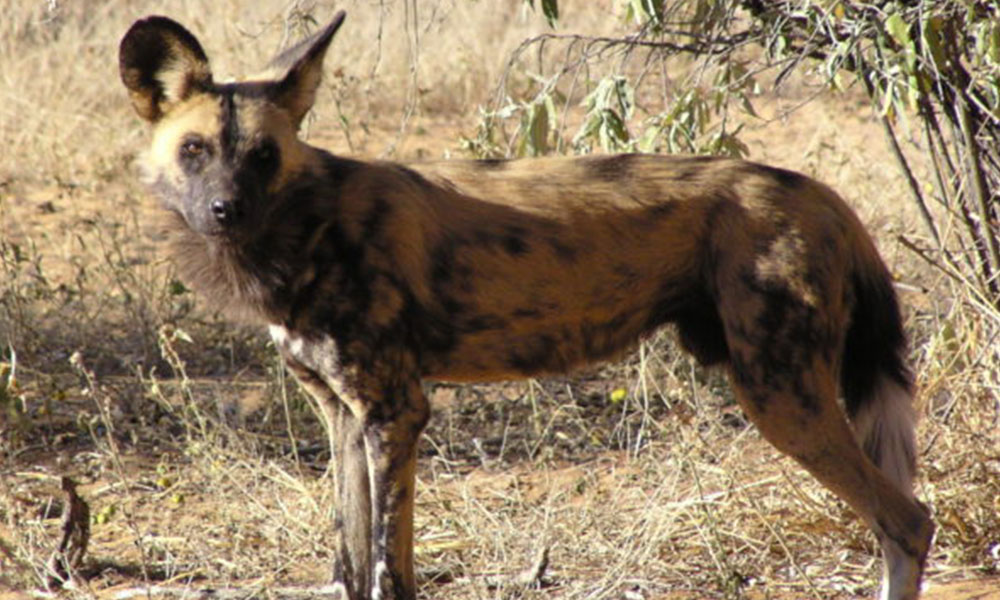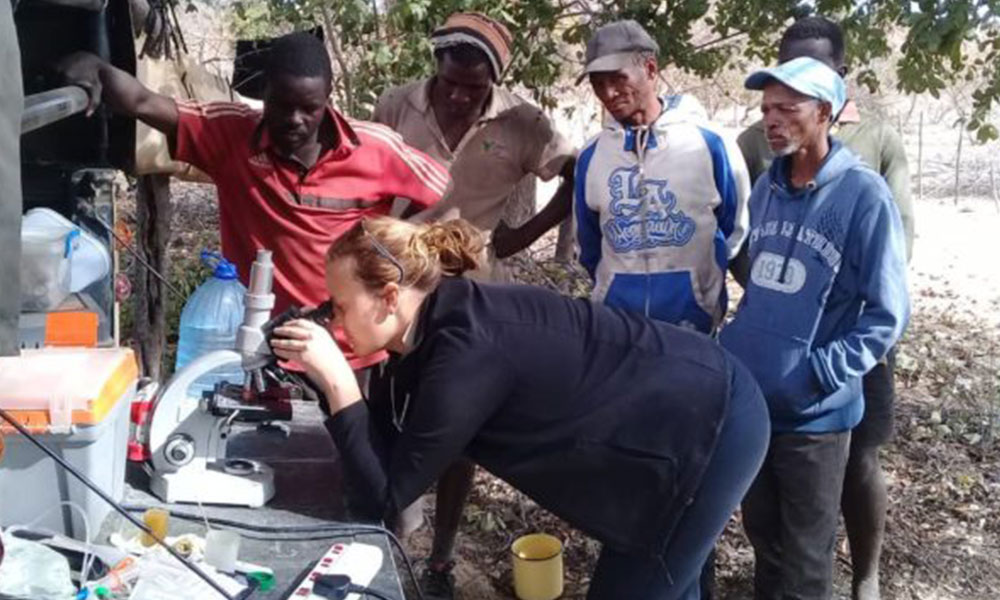Cheetah Conservation Fund Cares for Orphaned African Wild Dogs at Centre
-

- by CCF Staff August 21, 2018
FOR IMMEDIATE RELEASE
Cheetah Conservation Fund Cares for Orphaned African Wild Dogs at Centre, Focuses Conflict Mitigation Efforts in Eastern Communal Lands
OTJIWARONGO, Namibia (20 August 2018) – Working with the Ministry of Environment and Tourism, Cheetah Conservation Fund (CCF) staff transferred nine orphaned African wild dog puppies from the Eastern Communal Lands of Namibia to the CCF Centre for veterinary care. CCF is assisting with the nine wild dog puppies because it has a veterinary clinic and staff trained to care for orphaned baby animals. The pups are considered stable, but they remain under quarantine.
CCF has been studying African wild dogs and working in the Eastern Communal Lands for many years. CCF assists farmers there with its Future Farmers of Africa (FFA) training course and by capturing data on conflict hot spots and the carnivore species in the area, including wild dogs. Recently, CCF researchers noted an increase in conflict, particularly the Otjozondjupa and Otjinene regions, where wild dogs are persecuted and conflict is extreme. One possible factor is the dogs’ presence used to be seasonal, but since 2014, a small, unknown population of African wild dogs have started to permanently reside there. Because of these changes in species behaviour and the growing need for conflict mitigation, CCF is re-focusing its education efforts. CCF staff is now positioned in the Eastern Communal Lands to help farmers protect their young calves and vulnerable livestock, with the goal of reducing the killing of all predators.
“As a member of the Global Cheetah and Wild Dog Range Wide Group, it is important for CCF to address African wild dogs in Namibia, as cheetahs and wild dogs face the same threats, and their ranges overlap”, added Dr Marker. “It makes sense that we care for and help manage the species. There is room for every creature on the landscape. We just need to learn how the other lives, so we can all get along”.
The African Wild Dog is one of the most endangered carnivores in southern Africa and one of the iconic species still found in Namibia. Smaller and less visible than elephant, lion, buffalo and leopard, the African wild dog is an exceptionally adapted predator. These dogs can maintain a consistent speed of 48kph for 5km while hunting, running down their prey to exhaustion by taking turns at the chase. The cheetah may be the fastest mammal on earth, but the African wild dog is the winner in a long-distance endurance running competition.
Worldwide populations of African wild dogs are estimated to be between 3000 and 4000 individuals. The biggest threats to African Wild Dogs internationally are lack of habitat, human wildlife conflict and the reduction of genetic diversity due to isolated populations and persecution. The species has gone extinct in 23 countries. Namibia hosts no more than an estimated 250 of these elusive animals.
Namibia’ s conservation efforts and forward thinking policies, integrated conservation practices and wide-open spaces provides a haven for African wild dogs and many endangered species, including black rhinoceros and the largest population of free ranging cheetah. Namibia’ s populations of African wild dogs occur in the north-eastern regions of Namibia, ranging between national park lands and communal conservancies. Until now, the country’s CBNRM policy and partnerships between government and local communities has resulted in minimal conflict between people and wild dogs. But recent CCF research into a lesser-known population of African wild dogs living in the Otjozondjupa and Otjinene regions of the Eastern Communal Lands reveals high levels of persecution and extreme conflict with farmers.
African wild dogs cover huge distances and packs are always on the move, making it hard for farmers to track them down. Conflict is at its peak when the dogs raise their puppies in dens from April through to August, making them most vulnerable to persecution. Farmers seek out the dens, either destroying them or removing and killing the puppies and adults. The remaining dogs will then move on. Conflict may be reduced temporarily, but dogs can still access prey and opportunistically kill calves while moving into new territory.
For these rural farmers, the loss of even one animal can have a devastating financial impact. Cheetah Conservation Fund (CCF) has been working in the Eastern Communal Lands for more than 20 years, assisting rural farmers with improved livestock management to reduce conflict with jackal, caracal and cheetah. With the year-round presence of the African wild dogs creating conflict in the conservancies adjacent to CCF’s Centre, the organization is expanding efforts to address conflict with Namibia’s wild dog population.
Anthropogenic activities impact the wild dog’s fate. Bush encroachment is probably the biggest, single factor that contributes to the increase in Namibia’s farmer-carnivore conflict. A Brahman cow is a formidable and magnificent animal, with a well-known reputation to stand its ground and protect its young. With the temper of a Buffalo, they are not normally sought after by predators. But a combination of overgrazing, intense bush encroachment and extremely low numbers of prey species has however limited the capacity of the cattle to protect themselves as they naturally would. The cattle are forced to separate into small groups to graze, making them easy targets. With accelerating decreases in available prey species because of drought and illegal hunting, African wild dogs have adapted to preying on these cattle instead, favouring calves between four and 18 months-old.
The conflict between the African wild dogs and farmers will only get worse, unless mitigation measures are swiftly put in place. African wild dogs are one of Namibia’s most valuable natural resources – a hidden, national gem. They have the potential to attract tourists from all over the world to observe them in their natural environment. Tourism is a main driver of the national economy, bringing in millions of dollars of revenue to Namibia from international visitors. Tourism also creates direct revenue streams for localized economies in rural communities, through employment and benefit distribution from co-management of wildlife. This is why it is so important that we learn to value and protect our natural resources — and why we need to coexist with other living creatures on the landscape. Our futures – human and wildlife — depend on it.


About CCF
Cheetah Conservation Fund (CCF) is the global leader in the research and conservation of cheetahs. Founded in Namibia in 1990, CCF maintains a research programme studying the biology, ecology and genetics of the cheetah and operates the only fully-equipped genetics laboratory at an in-situ conservation site in Africa. CCF has created a set of integrated programmes based on this research that address threats to the cheetah and its entire ecosystem, including human populations. CCF operates from the principal that only by securing the future of the communities that live alongside the cheetah can you secure a future for the species.
MEDIA CONTACT:
Dr. Laurie Marker
phone: 081-1247887
Related Reading
-
December 6, 2024
CCF Continues to Expand its Paw Print in the Horn of Africa

